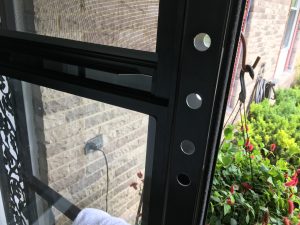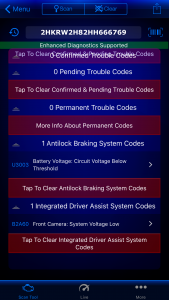Well, maybe not doom, but the usual mix of anger and irritation.
Liz wanted a storm door on the front, as she had long complained about the lack of airflow north to south through the house, which is mostly because there’s no south-facing window (aside from the bedrooms). So, in theory, the front door could be left open to aid this pneumatic conundrum were a screen to be installed there.
I liked the look of our front door, as it sported a rather medieval type of aged bronze handle upon dark maroon paint, so I was reluctant to hide that behind my outdated vision of a screen door: the Lubbock house’s back door–an exposed aluminum frame with a screen that was always torn and popping out.
But there have been some design updates in the last 20 years, and the modern iterations are coated aluminum with hybrid glass/screens. They also mount into frames with enough clearance so as to avoid doorknob complications, and they can accommodate the ever so important seasonal wreath which hangs from the main door.

Nevertheless, it wasn’t as straightforward as IKEA furniture. In fact, depending on its desired orientation, the screw holes had to be manually drilled out first. This process required some spacial orientation, and therefore concentration, to do correctly. But at this critical moment, Poppy attacked the mailman, and after I corralled the whippet any such concentration was shot, and of course I drilled out the wrong side. Sigh. At least the holes are small.
I also had to drill out rather large holes to attach the doorknob and deadbolt, during which the battery in my drill went dead, so the project experienced a rather unfortunate delay.

But alas! We now have a storm/screen door. I admit that it does look nice, and it’s convenient to use it throughout the day instead of the large wood door–mostly because the kid either slams it, or won’t close it at all.
As to whether or not it helps with ventilation–I don’t know yet, because since I installed it it’s been about 90 out and humid. Ohio weather (kind of makes me wonder again why we bothered with this).
I’ll just be content in that it looks nice.

–Simon





